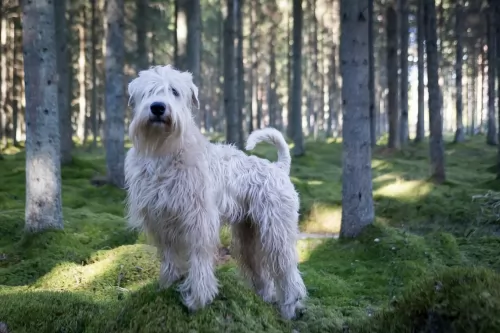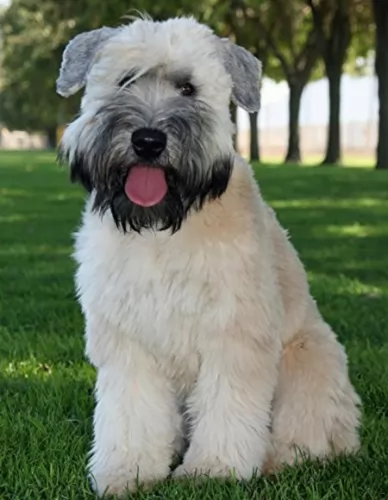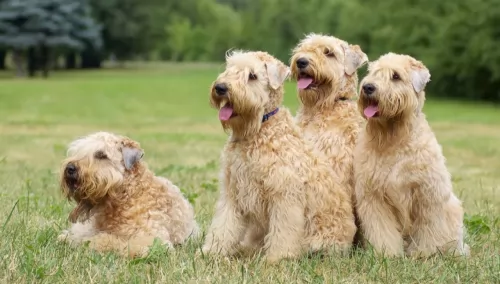 Petzlover
Petzlover Both Field Spaniel and Soft-Coated Wheaten Terrier are originated from United Kingdom. Both Field Spaniel and Soft-Coated Wheaten Terrier are having almost same height. Both Field Spaniel and Soft-Coated Wheaten Terrier are having almost same weight. Both Field Spaniel and Soft-Coated Wheaten Terrier has almost same life span. Both Field Spaniel and Soft-Coated Wheaten Terrier has almost same litter size. Both Field Spaniel and Soft-Coated Wheaten Terrier requires Moderate Maintenance.
Both Field Spaniel and Soft-Coated Wheaten Terrier are originated from United Kingdom. Both Field Spaniel and Soft-Coated Wheaten Terrier are having almost same height. Both Field Spaniel and Soft-Coated Wheaten Terrier are having almost same weight. Both Field Spaniel and Soft-Coated Wheaten Terrier has almost same life span. Both Field Spaniel and Soft-Coated Wheaten Terrier has almost same litter size. Both Field Spaniel and Soft-Coated Wheaten Terrier requires Moderate Maintenance.
 The Field Spaniel was developed to retrieve game, being developed in 19th century England as a hunting companion. Today they are still used as hunting dogs but he is essentially a family companion and show dog.
The Field Spaniel was developed to retrieve game, being developed in 19th century England as a hunting companion. Today they are still used as hunting dogs but he is essentially a family companion and show dog.
He was developed to be a medium-sized, all-black dog. Until 1901, spaniels were divided by weight, with the Field Spaniel being the bigger dog.With developing the breed, the Basset Hound was introduced and then English Springer Spaniels were also brought into the mix.
Today the Field Spaniel is still a rare breed even in the UK. To promote the breed, the dog has been registered as a Vulnerable Native Breed by the Kennel Club.
 This wheaten colored terrier hails from Ireland. Although the Wheaten has been around for a long time, it was in 1937 that he was recognized as a breed in Ireland.
This wheaten colored terrier hails from Ireland. Although the Wheaten has been around for a long time, it was in 1937 that he was recognized as a breed in Ireland.
The British Kennel Club also recognized the Wheaten and the dog was also exported to the United States. Serious interest started being shown for the Terrier in the 1970s. It was in 1973 that they were recognised by the American Kennel Club.
 The Field Spaniel is a medium sized dog, standing at 43–46cm in height and weighing between 18–25kg. The single coat of the Field Spaniel is fairly long with the traditional feathering at the legs, belly, chest and tail.
The Field Spaniel is a medium sized dog, standing at 43–46cm in height and weighing between 18–25kg. The single coat of the Field Spaniel is fairly long with the traditional feathering at the legs, belly, chest and tail.
The coat comes in solid colours of black, liver or roan. You might also find some ticked markings of white. The tail of the Field Spaniel is traditionally docked with the ears being long and floppy.
Happy, busy and active, the Field Spaniel makes an excellent family pet. They get on well with children and with other pets in the home. It is the kind of dog, that while friendly with all members of his human family, he forms a strong bond with one member whom he regards as special.
Bright and intelligent, he is also a dog that does well when socialized and trained, being more docile and less excitable than Cocker spaniels. The Field Spaniel is a dog who thrives on being busy and won’t relish lying around with nothing to do. He loves water and where there is a dam or pond, he’ll be there and want you to join him.
 The Wheaten is a medium sized dog standing at between 43 and 50cm and weighing between 13 and 20kg both male and female. The coat of the dog is soft, silky and wavy to even curly and is a wheaten to ginger color.
The Wheaten is a medium sized dog standing at between 43 and 50cm and weighing between 13 and 20kg both male and female. The coat of the dog is soft, silky and wavy to even curly and is a wheaten to ginger color.
The coat of the puppy is dark but as he grows up it changes into the wheaten color although the ears may be a dark brown color. Pet owners like that the Wheaten is a very low shedding dog.
Playful, social and friendly, the Wheaten has always been put to good use on the farm. These days he is pet and companion. He is energetic and playful so children love having him around.
He is slightly more hyper and energetic than other Terrier breeds so will require a good dose of exercise.
He is smart and strong willed, and training and socialization turns him into an amicable pet to have around, so much so that he is sought after as a therapy-dog.
They’re easy-going dogs with no aggression issues but they still make great watch dogs and want to do whatever it takes to look after- and protect their human family.
 Once people have owned any of the Spaniel breeds, they discover what a wonderful friend the dog is. He is loyal, loving, protective, brave, confident, fun-loving and smart. He isn’t aggressive but he may not like a stranger to reach out and pat him.
Once people have owned any of the Spaniel breeds, they discover what a wonderful friend the dog is. He is loyal, loving, protective, brave, confident, fun-loving and smart. He isn’t aggressive but he may not like a stranger to reach out and pat him.
The Field Spaniel is a wonderful dog and he will adapt to life in the city or in the countryside, just so long as he has his beloved human family close by.
 The Soft Coated Wheaten Terrier has always made an excellent farm dog, but today he is more suited as pet and companion.
The Soft Coated Wheaten Terrier has always made an excellent farm dog, but today he is more suited as pet and companion.
He adapts easily to life in the city or the countryside. Wherever he is, he will need his exercise. He also longs to be an active part of his human family, and then he’s happy, lively, social and friendly and is a great playmate for children.
 The Field Spaniel is a robust dog breed and can live to be 12 – 14 years of age. Apart from watching for ear infections with his long ears, there are some common dog illnesses that are worth knowing about -
The Field Spaniel is a robust dog breed and can live to be 12 – 14 years of age. Apart from watching for ear infections with his long ears, there are some common dog illnesses that are worth knowing about -
Most older dogs have hardening of the lens and this is when the lens turns a whitish or greyish colour. However if your dog has cloudy eyes, it doesn’t simply mean he can’t see well as he often can. Once a lens has a cataract, some people try nutritional support of the lens which can work to lessen the severity of developing cataracts.
Surgery can help but a veterinary ophthalmologist can determine if cataract surgery is needed as most times it isn’t. If you can’t afford surgery, it is still important to have your dog evaluated by a veterinary ophthalmologist so that you avoid further complications with your pet’s eyes.
Progressive Retinal Atrophy is another eye disease, a degenerative disease that affects the photo-receptor cells where they deteriorate over time and can eventually lead to blindness in the affected dog.
 When you bring a Wheaten Terrier into your home, you’re not likely to have too many vet fees as he tends to be a healthy dog breed, being able to reach 13, 14 or 15 years of age with good care.
When you bring a Wheaten Terrier into your home, you’re not likely to have too many vet fees as he tends to be a healthy dog breed, being able to reach 13, 14 or 15 years of age with good care.
Look out for a dog ailment known as Protein-losing enteropathy (PLE). This is a condition where the dog isn’t able to properly absorb protein in the digestive tract, so that it is passed in their stools.
It can be fatal, but if caught early, some dietary changes can keep it under control.
Also, look out for inflammatory bowel disease. This disease occurs when the stomach of the dog has a large number of inflammatory cells which can change the lining of the digestive tract, preventing the normal absorption of food.
 The Field Spaniel has medium-length to long hair and to avoid matting of the hair, the coat will need to be brushed a least twice a week. Many Spaniel owners take their pets to professional groomers to get the coat and ears trimmed.
The Field Spaniel has medium-length to long hair and to avoid matting of the hair, the coat will need to be brushed a least twice a week. Many Spaniel owners take their pets to professional groomers to get the coat and ears trimmed.
Check your Spaniels ears inside and out regularly, because loving water the way he does, the ears inside can remain damp and become a breeding spot for infection.
Remember to also check your Field Spaniel’s teeth as dental disease can be the root cause of many diseases.
Your Field Spaniel is an active breed and you want to be sure to feed him a high-quality commercially manufactured dog food which has been formulated for his activity level. Every now and again mix in some cooked brown rice, vegetables and chicken and also add in a bit of raw meat from time to time. Ensure cool, fresh water is always available.
 Brush your pet’s silky coat twice a week. Such a silky coat can get all tangled and matted. If you prefer, many people opt to rather have the Wheaten’s coat professionally clipped as then it is easier to handle. They like to have the hair clipped that hangs over the dog’s eyes.
Brush your pet’s silky coat twice a week. Such a silky coat can get all tangled and matted. If you prefer, many people opt to rather have the Wheaten’s coat professionally clipped as then it is easier to handle. They like to have the hair clipped that hangs over the dog’s eyes.
Other grooming tasks require you to check inside his ears for redness which could indicate an infection. Trim his nails and check him over for ticks and fleas.
Have your Wheatie trained and socialized as he is a stubborn dog breed and you want him to be well mannered and obedient.
Terriers like this are energetic dogs and he is going to need exercise every day. A walk for a dog is always a welcome experience as it gives him the opportunity to sniff around and pick up new smells. Play ball- or frisbee games with him as this can tire him out a bit.
If your dog shows signs of illness, get him to the vet. He is such a feisty dog that it can be unbearable to see him out of sorts.
Terriers are energetic dogs so if you feed your dog one of the commercial dog foods, make sure the label indicates what food it is. This is because the foods are manufactured according to the type of dog it is, its age, size and energy levels.
Always try and go for the high quality foods which don’t have all those unhealthy ingredients in them. Try to include some home-made food – nothing exotic and spicy – just plain, wholesome food that won’t upset his stomach.
Boiled chicken, brown rice or pasta and spinach, sweet potatoes and carrots is super tasty and nutritious. You can chop it up and add it to your pet’s kibble twice a week.
Try and include a little bit of raw meat to his diet occasionally as this can go towards ensuring he doesn’t get skin diseases. Always ensure he has a constant supply of fresh, cool water available.